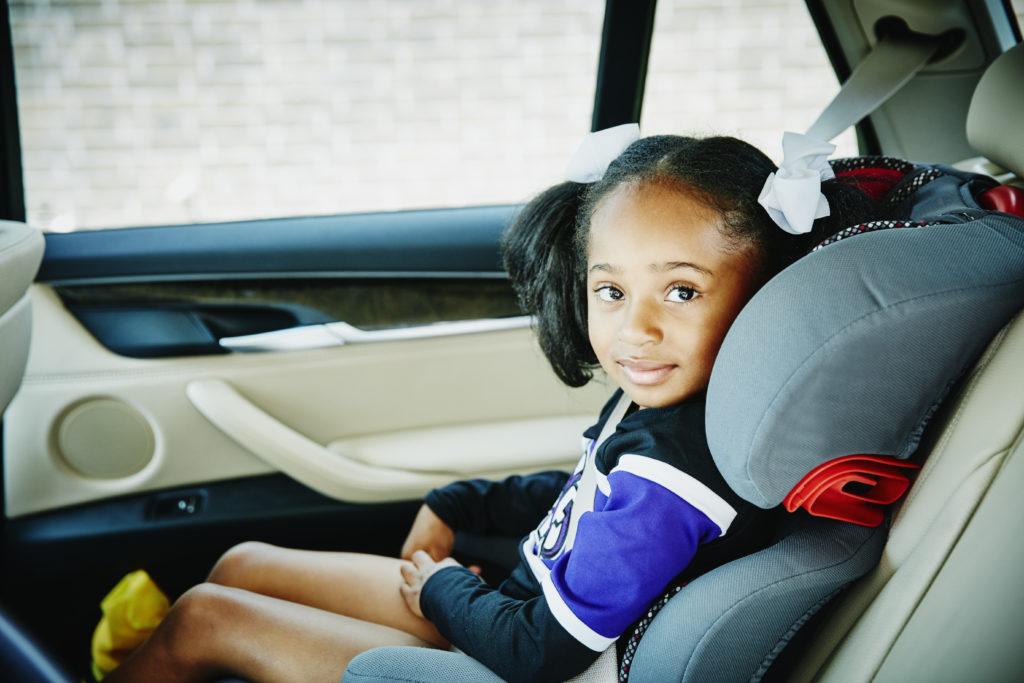By Dr. Bailey Alford

Smiling young girl riding in car seat in car
Summer brings time to spend with family, fun outdoors, vacations, and road trips. Here’s what you need to know to keep your little ones safe while in the car.
The dangers of hot cars
An average of 37 children die each year in hot cars. This includes children who are accidentally left in the car by a parent or guardian, children who gain access to the car and accidentally lock themselves inside, or children who are intentionally left in the car as a form of abuse. The temperature inside of a car can heat up very rapidly, even if the temperature outside is comfortable. Children are more sensitive to heat because they aren’t able to regulate body temperature as well as adults can. Children left in a hot car, even with the window cracked, or even for only 10 minutes can begin to suffer heat exhaustion leading to heat stroke, dehydration, shock and eventually death. Never leave your child alone in the car, whether running or not. Be sure to keep cars locked with the keys out of your children’s reach. Make it a habit to double check the car before exiting. Most accidents have happened when the child has fallen asleep on the way to the destination and the parent has forgotten they have been left inside. Accidents can happen to anyone, anywhere.
Car seat safety
In 2011, the American Academy of Pediatrics updated its policy regarding car seat safety based on years of rigorous research on crash data. The recommendation still stands today and advises all parents to keep their toddlers in a rear-facing car seat until 2 years of age, or until they reach the maximum height and weight requirements of their particular car seat. Injury prevention studies have shown that children under 2 years of age are 75% less likely to die or be severely injured in a crash if they are riding rear-facing. The guidelines also advise that all children should continue to ride in a belt-positioning booster seat until they are 4 feet 9 inches tall, which is usually between 8-12 years of age. Lastly, children should not be permitted to ride in the front seat of a vehicle until they are 13 years old. This is to ensure they are mature enough to wear a seatbelt correctly and large enough physically to withstand the force of the front airbag. Next are the answers to common questions pediatricians are asked by parents regarding car seats:
- Is my toddler too big to be rear-facing if their feet touch the back of the seat? No, children can still be very safe and comfortable rear-facing by bending or folding their legs. Leg injuries during a crash due to being rear-facing are rare and much less severe than the injuries to the neck and spine that can be caused by a toddler who is forward-facing too soon.
- How do I know which slots are the best height for the shoulder straps? This all depends on whether the car seat is rear-facing or forward-facing. For a rear-facing car seat, the straps should be placed on slots that are at or below your child’s shoulders. For a forward-facing car seat, the straps should be moved up to the slots that are at or above your child’s shoulders.
- How long do car seats last? Most car seats expire after 6 years from the date of manufacture. Check your individual car seat user’s manual for an expiration date. Never use a car seat that has expired or that is missing a label with date of manufacture.
- Do I have to replace my child’s car seat if we are in a car accident? This depends on the severity of the crash. The NHTSA (National Highway Traffic Safety Administration) states that seats that were in a minor crash do not have to be replaced. A crash is considered “minor” if the vehicle can be driven away from a crash, the vehicle door closest to the car seat was not damaged, no one in the vehicle was injured, the airbags did not go off, and you can’t see any damage to the car seat. Car seats involved in a car crash that do not meet these criteria should always be replaced. The cost of replacing the seat is covered by car insurance in most instances; contact your insurance provider for more information. Even if involved in a minor crash, the car seats can be replaced at the parent’s discretion.
Next month we will focus on implementing a healthy lifestyle for your children including meal planning and tips to get active.

